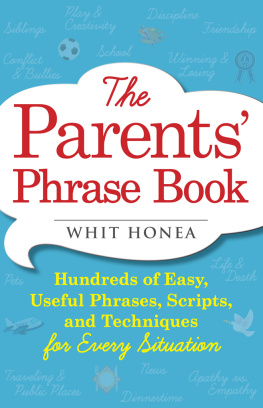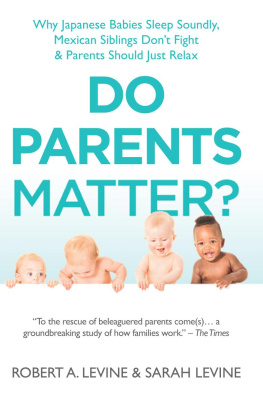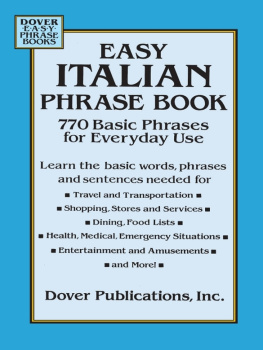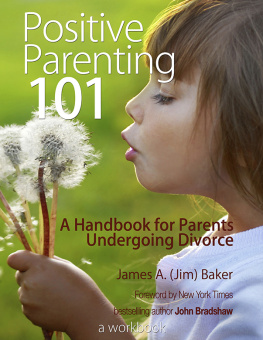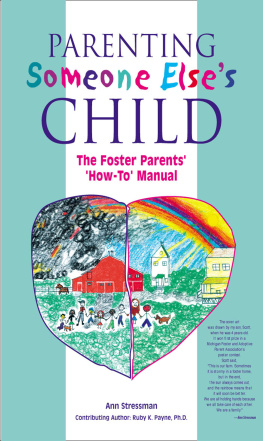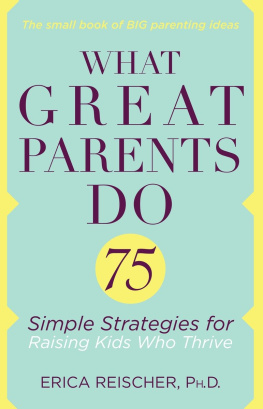The
Parents
Phrase Book
Hundreds of Easy,
Useful Phrases, Scripts,
and Techniques
for Every Situation
WHIT HONEA

Avon, Massachusetts
Dedication
For my wife Tricia and our boys Atticus and Zanethere are no conversations without you.
Introduction
You know that parent from the playground, the one who offers loud, unsolicited advice on your parenting options? Thats not me. Sure, I take my kids to the playground, and I might chat people up a bit if there isnt any Wi-Fi, but I would never presume to tell them how to parent their child.
But isnt this a book on?
Yes. Yes, it is. This is, in fact, a book where I offer parenting advice. The difference is that you paid for this book, which makes my advice solicited. In fact, Im a professional. That said, if you didnt pay for this book, then please tell your kid to quit throwing rocks; its a playground not a quarry.
What Is a Phrase Book?
At this point you may be wondering, what exactly is a phrase book and what page is quarry on?
There are many kinds of phrase books, but for the most part they all perform the same sort of service: to bridge the gaps of language.
This particular book is designed to help parents better understand the situations that arise in the lives of their children and what phrases it is appropriate to use in resolving them. The book provides suggestions on what you should say, what you shouldnt say, and what may happen in each case.
Its kind of like that old TV show Kids Say the Darndest Things, with Art Linkletter and later Bill Cosby. But instead of famous, charming people laughing over school-kid semantics, youve got me yelling across the playground.
Quarry is on this page.
How to Use This Book
Now, when your kid presents you with a challengethat is, throws a linguistic curveballyouve got a handy guide to refer to. No, this book does not double as a bat. Rather, its a place for you to explore new angles, find common ground, and gain helpful insight into furthering meaningful conversation with your offspring, because there is nothing kids love more than meaningful conversation with their parents.
The trick is getting the same meaning from the same conversation. Or something close to it.
How do you use this phrase book? However you want, but what I suggest is reading it and then keeping it someplace handy to refer to as the situations I outline here actually arise. Many of them will, and then you can reap the benefits of my wisdom. Oh, the sweet, sweet wisdom.
Keep it in the bathroom. Im okay with that.
One thing to bear in mind is that the phrases found in this book will be helpful only if you believe in them (apparently phrases are like fairies). Dont try to sell something that you wouldnt buy. Kids see right through that kind of thing. You know yourself, and you know your childtry to understand the given situation as best you can, and then use this book as a way to better the conversation, not end it.
Fine print: Obviously individual cases will vary. When in doubt, your best option is to follow your heart and do what you think is best for the specific child(ren) involved and the scenario at hand. You may not agree with what I offer, and thats fair. This is America, or some other country that sells my book, and discourse is healthy. The advice I offer is merely suggestion; granted, it is really awesome suggestion, but the words you use are entirely up to you. You are the parent; Im just some guy on the playground.
Now go forth and talk to your kids. And remember, it starts with a listen.
PART I
Life Lessons
CHAPTER 1
Discipline: Enforcing Rules and Pushing Limits
A great deal has been published about how to discipline children appropriatelyabout whether its through punishment or training. Those books, for the most part, are written by people with a lot of letters after their name and a framed piece of paper declaring them experts on the matter. However, none of that guarantees that they have any actual experience with children of their own. Fortunately, I have plenty.
My children enjoy a good limit pushing, and I enjoy quashing such things like so many broken hopes and dreams.
Actually, I am a fan of children testing their limits; after all, do we want our children to rise to the status quo, or to look for ways to go beyond it? The latter requires thinking outside the box, and that box tends to be sealed shut with the lacquer of implied limitations.
It is up to us, as parents and caregivers, to discern the reasoning behind our disciplinary reactions. Are the kids actually doing something wrong that might harm them or others, or do their actions simply defy the default setting of just the way it is?
Obviously, there are plenty of times when a childs actions (or lack thereof) require consequences based on established rules and a clear understanding of them. Thats good. Those moments teach responsibility (among other lessons), and it is important for parents to enforce such things, but it is also beneficial to allow some wiggle room in defining the limits of what we are willing to accept.
In this chapter well look at situations where a child has indeed run afoul of clear and reasonable rules of behavior. This does not mean that I think your kid is going to do bad things. Your kid is an angel. Im just worried about the rest of the people reading this book.
Also, by starting with worst-case scenarios, we are saving tons of pages of backstory and getting right into the conversations that are likely to follow.
Its for the environment. Youre welcome.
It Wasnt Me, and Other Rivers in Egypt
Denial is the classic go-to response for many children (and adults) when confronted with an accusation of wrongdoing. For example, consider the popular comic strip The Family Circus by the late Bil Keane, now drawn by his son Jeff Keane. Those kids are haunted by the gremlins Not Me and Nobody, and they never admit to squat. Chances are your family has similar gremlins running around your home. Dont feed them after midnight!
TYPICAL PHRASE YOU MAY HEAR: It wasnt me!
VARIATIONS: I didnt do it. Someone else did it. I dont know what happened.
This phrase, usually delivered with an amazing flair for the dramatic that borders on Oscar consideration, can mean one of two things: Either the child is innocent, or he is responsible for the misdeed and is trying to get away with it.
In this scenario were going to assume the child has broken a rule. The question becomes, why is he trying to get away with it? Is he afraid of the punishment such behavior warrants, or is he ashamed of disappointing us? Or both?
Both motivations are legit. While recognizing that, you should also recognize that this is a great opportunity to explain why the childs actions result in such feelings.
Experiencing shame upon disappointing you is evidence, on one level, that youve done a good parenting job. Your child doesnt want to let you down; he doesnt want to provoke a negative emotion from you.
On the other hand, fearing punishment and trying to avoid it are basic survival instincts. This is where you can explain to your offspring that accepting responsibility is a bigger boon to his character than denying it. You can also remind him that the long-term benefits of doing the right thing, rather than holding onto a belly full of guilt, are worth a few brief moments of discomfort.

